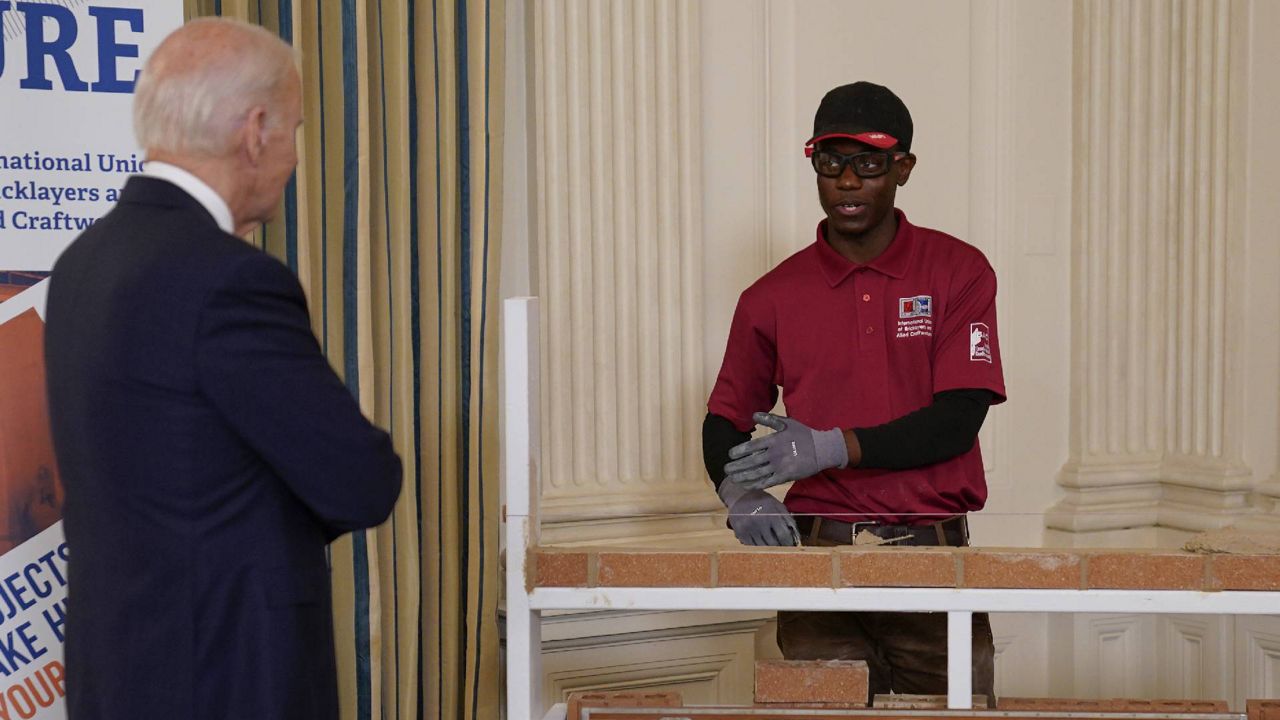President Joe Biden on Wednesday highlighted an ongoing effort to build and train a large infrastructure workforce, in coordination with colleges, unions, local governments, major companies and nonprofits — with a special focus on broadband internet, construction and electrification.
The Biden administration issued a challenge to those groups in June to create technical career pathways, expand skills training and open up more union jobs. All of it is meant to support the $1.2 trillion infrastructure law over the next five years and beyond, as well as the CHIPS and Science Act, which makes investments in semiconductor manufacturing.
He said in a speech Wednesday that more than 350 organizations across the country responded to his call to create a "21st century workforce."
"Companies -- many of you are here -- are forging partnerships with unions, community colleges, local nonprofits to create apprenticeships that train workers to develop the necessary skills," he said.
"It's the first time we have high-paying jobs and not enough people to do them," he said of the country's ongoing labor shortage. "Nice problem to have, isn't it?"
In fact, many of the programs announced Wednesday focus on training.
Biden pointed to the International Brotherhood of Electrical Workers' goal to train 12,500 people to install electric vehicle chargers.
He said he sat down with IBEW President Lonnie Stephenson before he won the presidency to discuss what would be next for union labor, especially in the context of a growing clean energy industry.
"Lonnie ... was convinced -- not by me, but convinced by circumstance -- that the future of labor was in the future," he said. "[It's] about what we have to do to deal with climate, advanced manufacturing, what we have to do to deal with things like those little computer chips that in fact mobilize everything we do, from your washing machine to your automobile to our weapons systems."
Biden acknowledged that union labor is often more expensive. A June report from the Bureau of Labor Statistics found union labor compensation averaged $51.21 per hour, compared with $37.80 for nonunion workers.
But, the president said: "It costs you less over time, because you have the best product that you're paying for."
Another program is an apprenticeship from United Airlines and the Teamsters to train 1,000 aviation technicians by 2026. Equity is a key focus, too: At least half of the technicians in the United program will be women and people of color, according to a White House fact sheet.
President Biden got a glimpse of some of the programs on the White House grounds, observing things like a welding technician training on virtual reality goggles and bricklayers’ technique for creating the structures needed for building foundations, dams and walls.
Biden joked to one first-year bricklaying apprentice that he could do some work for the president at his home in Wilmington: "What are you doing this weekend?" he asked.
Recently growing immigrant populations are also in mind: the Laborers' International Union of North America (LIUNA) and Welcome.US are identifying pilot sites for Afghan and Ukrainian newcomers with trade skills to get training, enabling them to work on infrastructure projects.
On the administration’s part, the Department of Transportation just released a checklist on workforce planning for the $125 billion in competitive grants it is awarding under the infrastructure law, to help applicants develop plans for training and equity in their applications.
The Department of Commerce released its Internet for All Workforce Planning Guide, which helps states and territories develop a workforce plan as required by the $42.5 billion Broadband Equity, Access, and Deployment (BEAD) program.
More than 35 community and technical colleges are also participating, the White House said.
Wisconsin’s Northwood Technical College and the Rural Broadband Association, for example, are partnering to develop training programs through which students go to school online and get on-the-job work experience with hundreds of NTCA rural broadband providers, earning proficiency badges.



